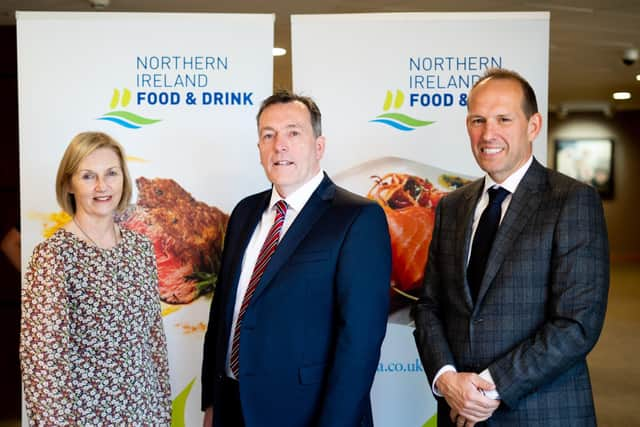New NIFDA chair in call for Stormont return
and live on Freeview channel 276
Mr Mullan is managing director of ABP in Northern Ireland and takes over from immediate past chair Nick Whelan. He will hold the position for two years. Ursula Lavery, technical and R&D director Europe, Moy Park has been appointed as vice chair.
Speaking after his appointment, George Mullan called for the restoration of the Northern Ireland Executive.
Advertisement
Advertisement
“This is a pivotal time for Northern Ireland food and drink as we seek to continue to grow the sector while navigating our way though the challenges of sustainable growth, climate change, food inflation and supply chain issues,” he added.


“We cannot address these challenges alone. Progress areas will require investment and collaboration with stakeholders and all levels of government. We need to get the new Assembly up and running, and for Ministers to be appointed to champion the industry at this pivotal moment.
Mr Mullan further explained: “Food and drink is a key strategic sector in the Northern Ireland economy.
“We are the largest single manufacturing industry here, generating £4.9 billion value added, and supporting 113,000 workforce jobs across the supply chain.
Advertisement
Advertisement
“We feed 10 million people worldwide, and our industry is world leading when it comes to quality, innovation, sustainability, animal welfare and commercial success.
“I am confident that we can boost our growth, build upon our sustainability credentials and play a key role in Northern Ireland’s economic recovery with the right level of collaboration between industry and government. It’s time for our politicians to get back to work.”
Meanwhile, Sinn Féin agriculture spokesperson, Declan McAleer, has said he is deeply concerned at what he calls the growing disparity in farm support measures now impacting across the island of Ireland.
As evidence of this, he points to the €10 billion plus of single payment monies that farmers in the Republic will receive over the next seven years, courtesy of the new Common Agricultural Policy (CAP) deal.
Advertisement
Advertisement
“There has been no local agreement on future farm support funding measures beyond 2024,” Mr McAleer commented.
“The north/south divide in terms of farm development funding is also immense and growing.
“Again, no post-Brexit funding for projects of this nature has been agreed for Northern Ireland.”
The West Tyrone MLA went on to point out that farmers in Northern Ireland will not be eligible for the €15,000 lump sum payment, announced by Brussels last week in response to the fast-rising input costs now impacting on every farm business across Europe.
Advertisement
Advertisement
“Northern Ireland is part of the European Single Market for goods. However, the Brexit deal precludes all local farmers from any future aid packages agreed by the European Commission for the agricultural industry.”
Prior to the recent Assembly elections, McAleer wrote to Department of Environment, Food and Rural Affairs (Defra) secretary of state George Eustice MP, in his capacity as chairman of the Stormont agriculture committee.
The Sinn Féin representative commented: “I called on the Defra minister to provide support for farmers in the north, impacted by the huge spike in production costs.
“Farmers were already experiencing significant challenges as a result of the increasing cost of fuel, feed and fertilisers but this has been compounded by the Russian invasion of Ukraine.”
Advertisement
Advertisement
Mr McAleer concluded: “This invasion has caused a devastating humanitarian crisis and will also have a serious impact for the local agri-food sector, given the worldwide reliance on Ukraine’s agriculture produce and Russian supplies of gas and food.”